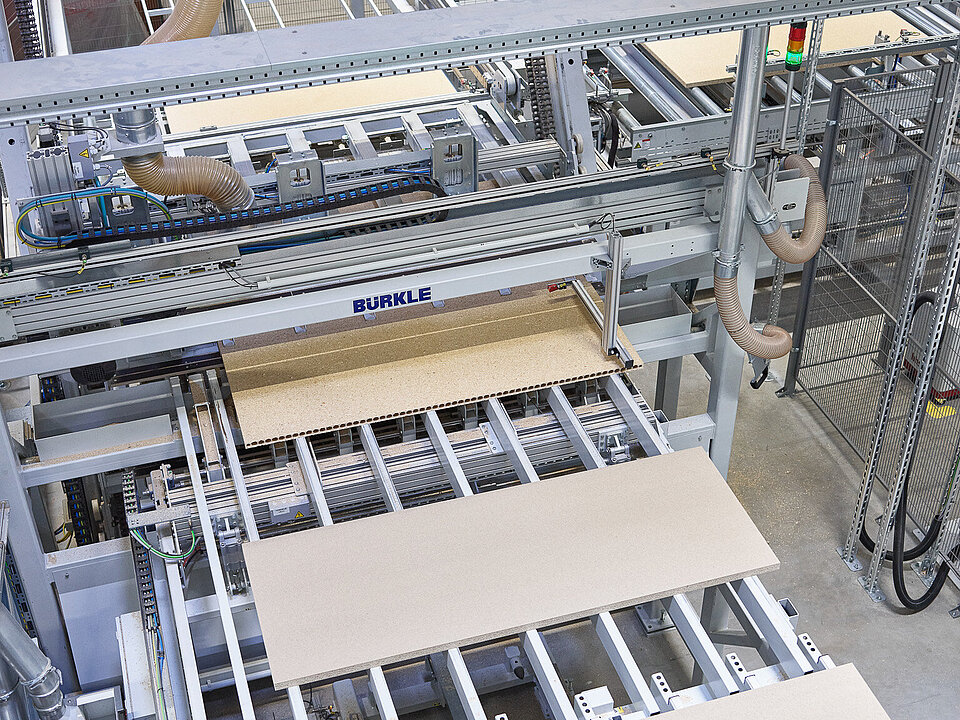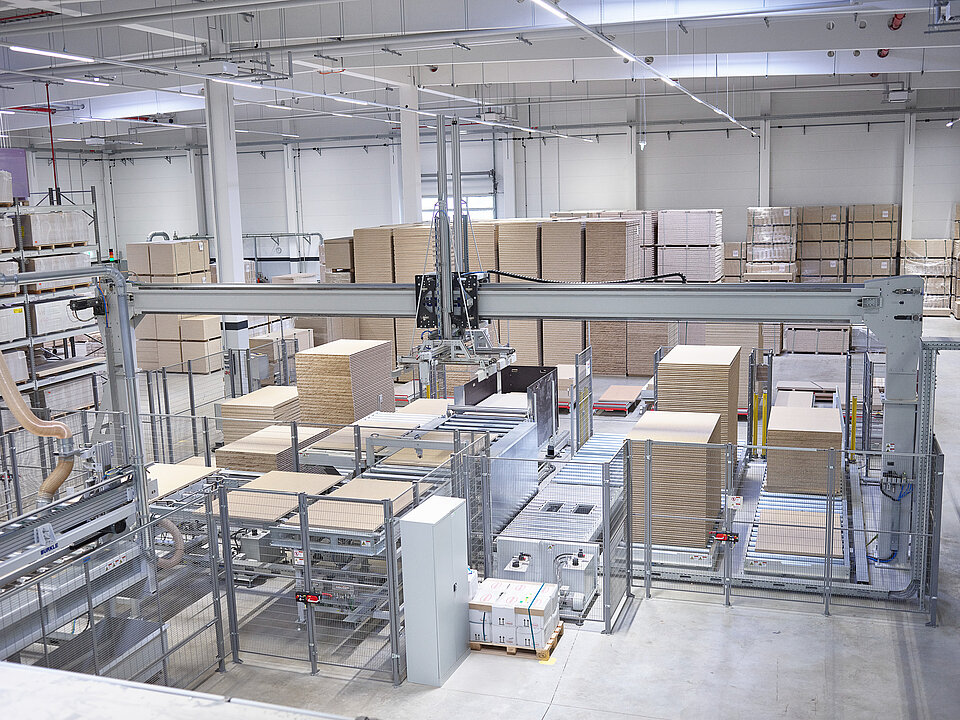Moving into the future of door production together
Through continuous investment in cutting-edge manufacturing technologies, the company ensures that its products not only meet the highest aesthetic standards but are also functional and long-lasting. A particular emphasis is placed on the digitalization and automation of production processes to further enhance efficiency and quality. Sustainability also plays a central role: Lebo relies on PEFC-certified wood sources and resource-saving production methods.
With this combination of tradition, technological progress, and a clear commitment to sustainability, Lebo asserts itself as one of the leading providers in the door market. This innovation course at Lebo is also confirmed by the recent investment in a fully automated BÜRKLE system for manufacturing door blanks.
As a full-range supplier, Lebo, together with its sister company Huga, offers a wide spectrum of door solutions for residential and commercial buildings. From classic interior doors and stylish frame doors to specialized functional and sliding doors, the portfolio covers a broad array of requirements. The focus is on high-quality real lacquer surfaces in standard and custom RAL colors as well as the durable Durat® surfaces, which impress with their high resistance.
Setting new standards in door production – the automation project at Lebo
By establishing fully automated door manufacturing, Lebo GmbH has taken a forward-looking step. In a newly constructed hall at the Bocholt site, a state-of-the-art production line has been created that automates the entire door blank process from raw material to finished product in a continuous operation. This step represents not only a technological but above all a structural realignment: moving away from historically grown, manually dominated production islands toward an integrated, digitalized overall system. The goal was to develop a system that could automatically handle Lebo’s broad product range from standard to special doors.
This meant implementing fundamental changes not only in machine technology but also in organization, data structure, and process logic. “With the new door system, we have brought new possibilities and competencies in the production of door blanks in-house. The continuous automation of the BÜRKLE system allows us to produce even more flexibly in batch size 1 with fewer personnel,” explains Thorsten Temminghoff, Plant Manager at Lebo, describing the major project.
At the heart of the new production line was the integration of all production steps into a single, automated process. The previously scattered production across various hall areas was centralized. Material handling, intermediate storage, and work papers have been almost completely eliminated.
Special attention was paid to the endless processing of inserts: different materials are cut inline and recycled through intelligent offcut management. Up to six offcuts can be managed in the system and efficiently processed further, representing significant progress in resource efficiency.
The processing of facing sheets was also newly designed; both smooth and textured facing sheets are now cut directly in the system. In the frame construction, a sophisticated stile handling system is used, which provides and processes different stile types and dimensions from both bulk and single magazines inline. Especially the single magazine offers the possibility to quickly respond to special requests while continuing to produce in batch size 1 at full capacity.
A major special feature of the project was connecting the new hall to the existing production hall, which is separated by a road. Bürkle quickly developed a process solution that connects both halls via a bridge, which simultaneously serves as a cooling section. This means that door blank production takes place in the new hall, while stacking takes place in the hall on the other side of the road.
“Of course, we had high quality requirements for material handling and placement accuracy. But the intelligent control of the system as well as the combination of batch size 1 and series production of standard doors in one system were also central elements of our specification sheet,” continues Temminghoff.
“BÜRKLE stood by us throughout the project with solution-oriented consulting and also responded to changes and new ideas on our part at later stages. The good communication on equal footing ultimately led to a successful project without delays.”
Real teamwork and cooperation lead to success
In addition to the structural and technological aspects, the transformation process was a key part of the project. The switch from manual to fully automatic processes required a realignment of internal logic, both technically and organizationally. Material stacks now had to be provided in production sequence, and the ERP system had to deliver precise data. A “saw next door” as an emergency solution for missing parts was no longer possible.
The space conditions in the new hall also required a highly precise plant layout. Processes had to be nested, material flows partly routed over several levels. Here, the engineering expertise of partner BÜRKLE became evident. Consistent thinking in terms of material flow, movement logic, and space efficiency was required.
Despite the high production pressure that the project faced in its final phase, the cooperation of all parties involved was described as extremely solution-oriented and collaborative. Bürkle explicitly praised the great commitment and flexibility of the Lebo team.
“For us, this project was special in many ways. It was not just about building a modern production system. The transition from manual production to a fully automated system required a lot of coordination, flexibility, and true partnership. I was particularly impressed by the openness of the Lebo team to this change and their great commitment on site. Together, we were able to set not only technological benchmarks but also experience real teamwork between two companies,” summarizes Heribert Tölle, Site and Project Manager at BÜRKLE.
Conclusion on the project
Fully automated door production, combined with state-of-the-art robotics and automation technology, represents not only a technological milestone for Lebo but also marks the beginning of a new production culture: digitally networked, resource-efficient, and highly flexible. The close partnership between the companies and the willingness of all involved to question familiar structures and explore new paths together are the key success factors of this major project.

